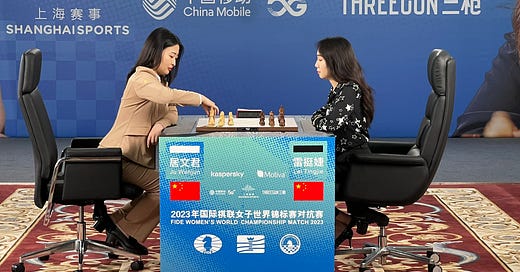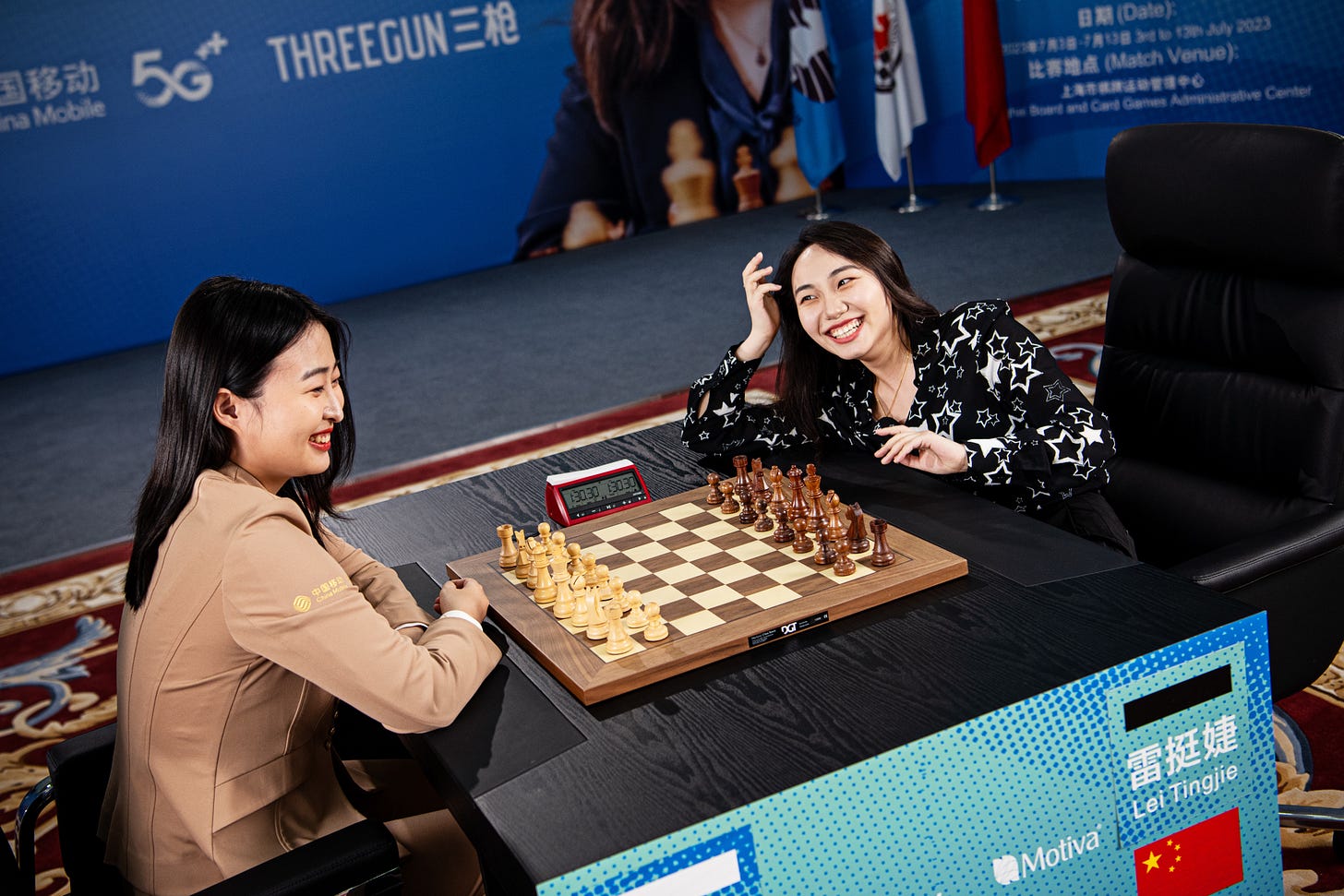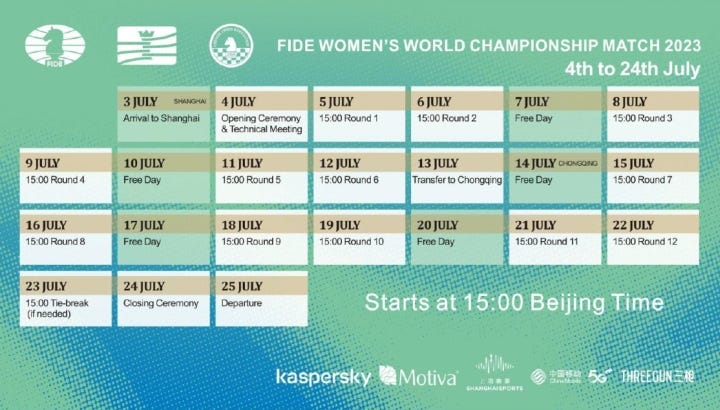The Women’s World Chess Championship starts tomorrow! Ju Wenjun vs. Lei Tingjie. One thousand two hundred and fifty-eight days since Ju Wenjun defeated Aleksandra Goryachkina in rapid tiebreaks to win the last World Championship. That was Ju Wenjun’s third title, and third in a row too! A rematch seemed likely until Russia invaded Ukraine early last year. Since then, Goryachkina has faltered while Lei Tingjie has flourished in limited action. With Ju Wenjun’s level a mystery due to her also limited activity, this title match is the perfect showcase to see just how strong the these two players really are!
How did we get here?
The last World Championship match between Ju Wenjun and Aleksandra Goryachkina took place in January 2020. World Championship matches are supposed to take place at two-year intervals, placing the expected date of the next one at around January 2022. In this case, however, if I recall correctly, FIDE believed they were already behind schedule. They did not intend for the Women’s World Championship match to take place in the same year as the overall World Championship match, which was slated for November 2020. As such, the 2020 Women’s World Championship was placed as early in the year as possible with the hope of arranging the next one for November 2021 to align it with the overall World Championship. The plan was to have the overall World Championship take place in November of even years while the Women’s World Championship would take place in November of odd years.
That 2021 Women’s World Championship match? It never happened. COVID happened instead, delaying both World Championships. The overall World Championship between Carlsen and Nepo took place in November 2021 after a full-year delay. But the Women’s World Championship was delayed even further when Russia invaded Ukraine, postponing the Women’s Candidates from an expected date in 2022 to instead finish in 2023. FIDE did not let the delay for the Carlsen-Nepo match affect the next cycle. They already seem back on schedule with the Nepo-Ding match that took place this past April and the next match planned for November 2024, back to an even-year November. Meanwhile though, FIDE seems content to just skip over an entire Women’s World Championship cycle. Instead of having Women’s World Championships in 2021 and 2023, we just have this one in 2023 (that’s been delayed a year-and-a-half if you treat it as the “2021” match) and the next match won’t be until 2025.
What’s been going on for women’s chess?
In the intervening time between the most recent World Championship and the upcoming one, women’s chess has been severely limited. The pandemic shut down over-the-board chess for everyone for awhile, but even after it started to return in 2021, China still had significant travel restrictions in place through late 2022. Meanwhile, after Russia invaded Ukraine in early 2022, Russian players were no longer permitted to play in Europe. That did not bode well for women’s chess, in which the top two countries are China and Russia and the majority of active GMs rated above 2500 are from one of those two countries. Many of the top women’s players from China or Russia haven’t played much for those reasons, including both participants in this World Championship match. (UPDATE: Jovanka Houska clarified during the broadcast that Chinese players were only permitted to play one tournament in 2021.)
Meanwhile, the top players scarcely playing has not been the only difficulty women’s chess has faced since the last World Championship. Among independent tournaments outside of FIDE, the Cairns Cup, the only active women’s super-tournament, did not return until last month, skipping over 2021 and 2022. Meanwhile, the two top open Swiss tournaments that typically attracted the top women’s players, Gibraltar and Isle of Man, no longer exist and no similar Swiss tournaments have replaced them. FIDE tournaments haven’t fared much better, as it would take another post entirely to go over everything that went wrong with the recent cycle of the FIDE Women’s Grand Prix.
Where is Aleksandra Goryachkina?
Since losing the last World Championship match, Aleksandra Goryachkina didn’t let the pandemic stop her from becoming the best women’s chess player in the world! She crossed 2600 for the first time in mid-2021 with outstanding performances in Russian open tournaments in particular and was the clear No. 1 in the world among active players. Unfortunately for her though, there was no World Championship in 2021 and no Candidates either.
By the time the Candidates rolled around in late 2022, Goryachkina’s level had been hampered by Russia’s invasion of Ukraine, at which point she said she stopped receiving support from her federation. The new knockout format, which historically has favoured China and did not suit Goryachkina’s lack of proficiency for rapid tiebreaks, did her in and she was ousted by China’s Tan Zhongyi, the lowest seed in the whole Candidates. Goryachkina would not be getting another chance at the title just yet, and maybe ever.
How did Lei Tingjie make it here?
Besides Goryachkina, there were no other women’s chess players above 2500 who showed any signs of raising their level since the last World Championship match, except maybe one. From the last World Championship match in early 2020 through the summer of 2022, Lei Tingjie only played one tournament. But it was the FIDE Women’s Grand Swiss, the biggest women’s tournament of them all in that period, and she won it. She won it convincingly with an over-the-moon 9.0/11, a 2735 performance level like nothing we had ever seen from her. Was it a fluke?
Lei Tingjie is no ordinary Chinese chess player. Except that she was. When she was age 13-and-a-half, she was rated 1984, not particularly high considering other girls have made it to IM or even 2500-rating by that age, Ju Wenjun herself was 2300 at the same age, and the No. 1 girl for age 13 is usually at least in the 2100s or higher. Despite that late start, Tingjie still managed to become one of just seven women’s chess players in history to reach GM as a teenager when she did it at age 19. She was rapidly on the rise through her late teens and hit 2545 right before turning 21. Tingjie seemed on track for the 2600s, but then, she went to university. When exactly she enrolled, I’m not sure, but I believe it was around 2018. I don’t know if that is what’s really to blame, but it at least somewhat coincided with a hundred-point rating drop to 2450 and the year-and-a-half thereafter when she never could regain a place in the top 10.
But during university, Lei Tingjie did something that few university chess players do: she figured it out. She figured out how to balance university with chess. And she started to rise back to 2500. Her last two tournaments before the pandemic, she played the open FIDE Grand Swiss and Gibraltar. At both, she showed she could hold her own against the 2600s, facing 14 of them (including two 2700s, Sam Shankland and David Navara), and only losing three times. Her last such game she even won, against Vasif Durarbayli. If Tingjie could have kept playing tournaments, who knows what she would have accomplished? But when she finally did return a year-and-a-half later at the FIDE Women’s Grand Swiss, she proved she was still the same player, if not better. So maybe it wasn’t a fluke.
It didn’t matter if it was a fluke because we would know for sure she was legitimate at the Candidates. And just like she did at the Grand Swiss, she won it easily. In three knockout matches, she didn’t need any tiebreaks. She beat both Muzychuk sisters and Tan Zhongyi. She beat Tan Zhongyi in Chongqing, the city where they both grew up and probably still live in. Tingjie won the the Candidates with another 2600+ performance, her third in a row after the Grand Swiss and Gibraltar. She has looked every bit like a 2600+ player, but what about Ju Wenjun?
Is Ju Wenjun ready for the match?
Ju Wenjun did not look ready for the match. Whereas Lei Tingjie at least played the Women’s Grand Swiss and Women’s Candidates, Ju Wenjun had not played any tournaments internationally since the pandemic began. Her last tournament in 2020 right before the pandemic and right after her last title defense was the Women’s Grand Prix where she fared horribly. Since then, she only played a few games on the women’s boards in the Chinese League and in the open Chinese Championship and was not doing particularly great at either, at least not well enough to think she was back to a 2600 level.
With little recent tournament experience, Ju Wenjun signed up for the 2023 Sharjah Masters, an all 2500+ GM open tournament where she was a bottom ten seed in a field of 80. Amazingly, she was among the leaders in the first half of the tournament and finished with an even score against opponents with an average rating of 2680. She beat two 2600+ players to start the tournament, including Vidit, the strongest player she ever defeated despite not having faced an international player over the board in more than three years! Ju Wenjun continued that success into the Chinese League last month, doing about as well as she possibly could against lower-rated players on the women’s boards, winning most of her games and not losing any. This was nothing like the form she had been showing since her last world title!
I don’t know how Ju Wenjun or Lei Tingjie have done it, but they both seem capable of increasing their level without playing any real tournaments at all.
Who will win?
Lei Tingjie will win. Lei Tingjie looked slated to be the clear favourite for the match in light of her success and Ju Wenjun’s floundering since the last title match, but Ju Wenjun’s recent performances really put her back into the picture to at least have good chances of making it a close match.
Not everyone agrees with me. In fact, most people don’t agree with me. I asked nine experts I highly respect for predictions. While almost all of them said the match would be close, eight of the nine picks were for Ju Wenjun.

Meanwhile, my own followers turned on me. After an almost 50-50 split back in April, you mostly sided with Ju Wenjun after her excellent performance in Sharjah!
Ju Wenjun does have some of advantages. She has won two of her three World Championships in matches before, beating Tan Zhongyi 3-2 in 10 games and Aleksandra Goryachkina in tiebreaks after 12 games. She has match experience. The thing is, Lei Tingjie also has match experience since FIDE switched the recent Candidates to the match format. Another advantage Ju Wenjun has is her rapid and blitz play. Lei Tingjie has become very strong in classical, but there is little to suggest the same for faster time controls. Tingjie struggled on the Champions Chess Tour online compared to Ju Wenjun, and her over-the-board speed chess results are also lacking compared to the champion. Lei Tingjie did beat Ju Wenjun in an over-the-board rapid game in April during the Asian Games qualifiers. But if it comes down to tiebreaks, I still think Ju Wenjun would be the overwhelming favourite to retain her title.
Despite Ju Wenjun’s match experience, she is definitely not unbeatable game-by-game. She lost two classical games to Tan Zhongyi in ten games, one out of four games against Kateryna Lagno, and three out of twelve games to Aleksandra Goryachkina. Lei Tingjie now is probably stronger than any of those players at the time the matches were played. With those losing percentages, I would be surprised if Ju Wenjun doesn’t lose at least two games, more likely three, if not more. If Ju Wenjun is going to lose that many games, can she win just as many games to at minimum force tiebreaks?
I don’t see it happening. In Lei Tingjie’s last 51 games, she has only lost four times. The game she lost in the Candidates against Tan Zhongyi (2526) was more like a fluke. Lei was outplaying Tan and just made a one-move blunder in time trouble. She usually doesn’t even get into time trouble. Besides that loss, the other three losses were to SL Narayanan (2637), Eric Hansen (2611), and Rustam Kasimdzhanov (2657). I think Ju Wenjun will have had to reach that level just to beat Lei Tingjie, and perhaps towards at least the middle of that range to beat her multiple times. As good as she is, I don’t expect such a high level from Ju Wenjun. If it happens, it would probably be the best level of her whole career.
Another big factor in any World Championship match is pressure, but in this match I would expect the pressure levels to be at a minimum. China has already won the match, leaving no national pressure. The players are also great friends, leaving no animosity. In general, Ju Wenjun and Lei Tingjie are both held in high regard not to experience pressure. Lei Tingjie is not expected to get into time trouble, while Ju Wenjun and her speed chess skills are capable of playing in trouble, if she were to face it. Even beyond that, Lei Tingjie is the epitome of not caring. Hikaru Nakamura is known for his catchphrase, “I literally don’t care.” But Lei Tingjie puts Hikaru to shame there because while Hikaru does care about one thing, the World Championship, Tingjie probably doesn’t even care about that. If Ju Wenjun has to rely on Lei Tingjie making big mistakes to win, the champion is going to be in trouble. To Tingjie, chess is just chess. She has come here to play and that’s that.
(Aside: What I think happened is Ju Wenjun was just relaxing at her level the last few years. Then late last year, she saw how Lei Tingjie became a boss seemingly overnight and thought, “Oh no, now I have to become a god at chess too!” I don’t think she totally made it, at least not to Lei Tingjie’s level, but I definitely applaud her efforts.
This is how chess is supposed to be. Each of them is pushing the other to get to higher levels by getting to those higher levels themselves. Instead, the Women’s World Championship hadn’t been a knockout format the last 20 years. Players only needed to be around 2500-level to win even though there were more than a few players close to or above 2600. If it wasn’t like that, we would have seen 2600-level players like Humpy and Anna Muzychuk pushing the ones right below them for the World Championship crown just like Lei Tingjie and Ju Wenjun did with each other, instead of having those players like Humpy and Anna Muzychuk or the ones right below them never even compete for the World Championship in their prime.)
It’s a BIG match!
The question of who will win the match is not the only thing that’s interesting about it. With Lei Tingjie clearly being a 2600+ player and Ju Wenjun’s recent efforts suggesting she might be as well, there is a good case that both players are well above 2600 level. The only other comparable one was between Hou Yifan and Humpy Koneru, but it’s not so easy to say that match was strongest because it was in 2011 well before Hou Yifan really took off. The casual chess fan might not realize either of these matches are between 2600-level players just from looking at the ratings, but as Elo experts know, one can’t trust the ratings of players who haven’t been playing. Keeping the players’ true levels in mind, this would arguably be the first time in history there is a Women’s World Championship match between two 2600+ level players, making it the strongest match in history.
If Ju Wenjun wins, she’ll become a four-time champion. She can’t tie Georgian legends Nona Gaprindashvili and Maia Chiburdanidze with their five titles in a row just yet, but a fourth title would give her the chance to do so in her next title defense. If Lei Tingjie wins, she will become World Champion for the first time and I’d be curious to see where she tries to take her career after that.
Coverage
You can catch coverage of the match by chess.com on YouTube and Twitch, featuring top commentators like Jovanka Houska, Alexandra Kosteniuk, and even Judit Polgar herself. The match start time is 3 PM in China (which is 12:30 PM in India, 9 AM Central European Time, 3 AM on US east coast, and 12 AM on US west coast. Only time will tell who will post recap videos.) Game 1 is July 5th. Game 2 is July 6th. Game 3 is July 8th, and so on.










